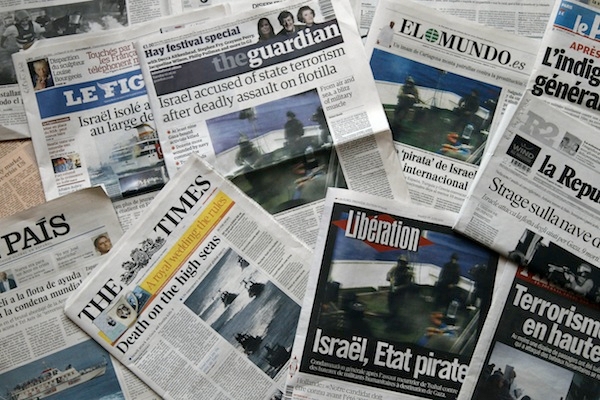What would George Orwell write about today? asked the Guardian. Here’s our nomination: an EU report that recommends giving the EU more powers to sack hacks, regulate the press and dole out subsidies to ‘good’ journalists, a pan-European press and failing newspapers. The report is called ‘A free and pluralistic media to sustain European democracy’. Be very afraid.
Its preamble cites the misconduct of certain British journalists, before the report recommends a set of EU-sanctioned media regulations. All EU countries should have ‘independent media councils’ set up to investigate complaints, it says, and these media councils should police newspapers to make sure they have strict codes of conduct, prominently displayed — also ownership details, all conflicts of interest declared. And so on.
These ‘media councils’ should, say the authors, have ‘real enforcement powers’. They should be able to impose fines, ‘order print and broadcast apologies’ and (most sinister) order the ‘removal of journalistic status’. An EU mandarin could soon dub Rod Liddle a non-hack. The councils themselves should ‘follow a set of European-wide standards and be monitored by the Commission to ensure that they comply with European values’. The report urges the media councils to have a ‘politically and culturally balanced and socially diverse membership’ (including fascists?)
The authors recommend that EU cash is doled out to ‘good’ journalists. ‘Europe-wide awards’ should go to “talented journalists and those who have made significant breakthroughs”. (No prizes for guessing what sort of breakthroughs!) Journalistic fellowships should be made available to quality investigative hacks. Note the distinction between quality journalism, which should receive more state funding, and ‘sensational (and profit-making) stories’. You can hear the author’s teeth grind as she types the words: ‘profit-making’.
And of course there are subsidies: ‘There should be a provision of state funding for media which are essential for pluralism (including geographical, linguistic, cultural and political pluralism), but are not commercially viable. The state should intervene whenever there is a market failure leading to the under-provision of pluralism.’ Why should an EU taxpayer prop up an ailing Slovakian knitting magazine?
The report also wants more money for a pan-European press: ‘Funding for cross-border European media networks (including such items as translation costs, travel and coordination costs) should be an essential component of European media policy’. Again, it doesn’t really matter if nobody buys these pan-European rags. What matters, to the top-down European thinkers, is educating citizens about the grand European project. ‘Media literacy should be taught in schools,’ recommends the report. Is the EU now enforcing the teaching of Media Studies?
This gets to the crux of the problem. All solutions require more spending and more bureaucracy. No solutions require cuts and the ceding of power. The answer is always funding: funding for reports, researchers, assessments, academics, monitoring centres: data-gathering and regulation, hand in hand. And if that doesn’t work, the answer is more data-gathering and better regulation.
The idea that freedom of the press comes from the bottom-up, that a vibrant media can’t be ordained from on high, hasn’t occurred to the authors. It’s not surprising really to find out that authors consulted politicians, professors, lobbyists in writing their report, but only very few actual journalists. Well, what would they know about the press?






Comments